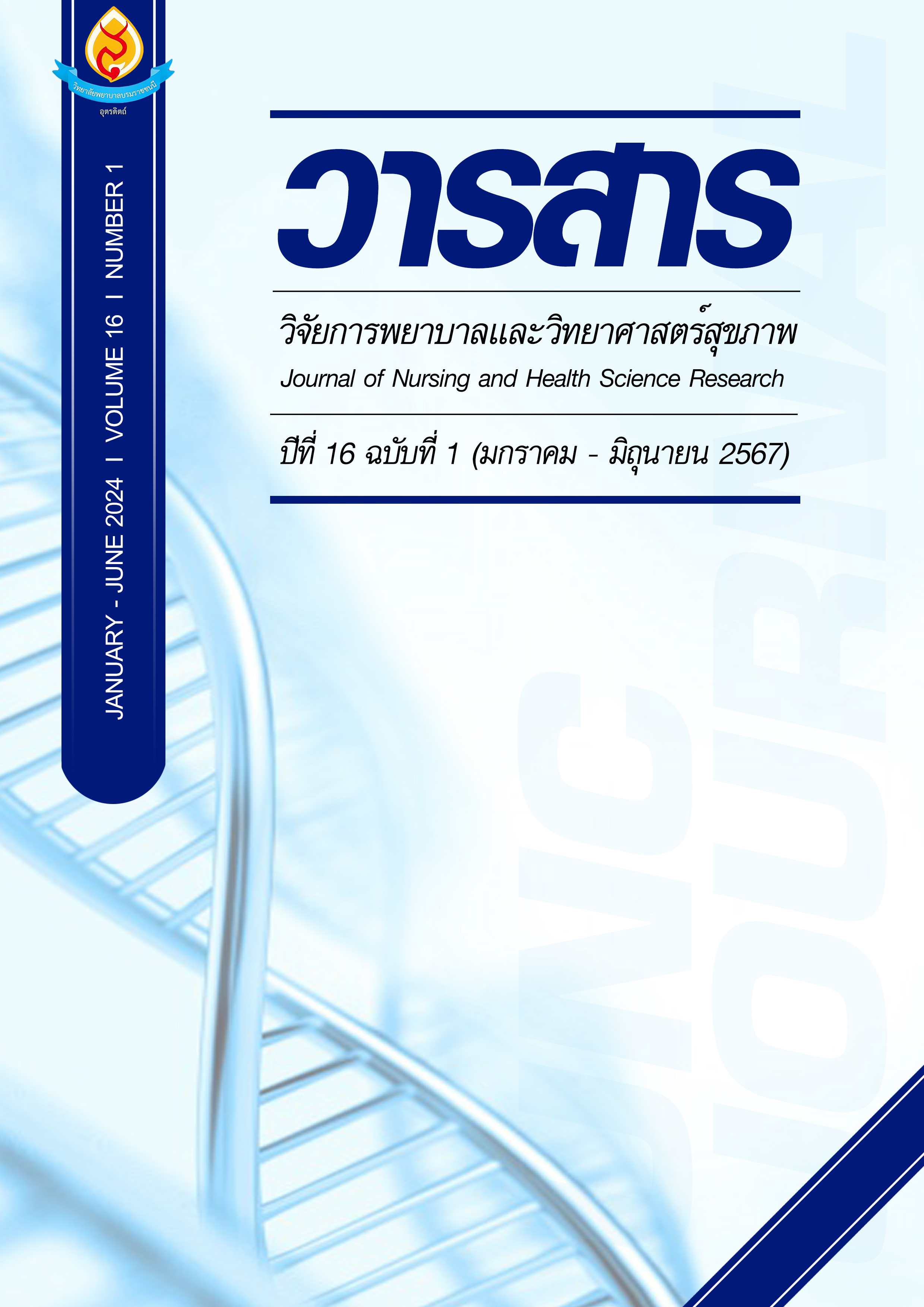ประสิทธิผลของโปรแกรมสร้างเสริมพลังสุขภาพจิตต่อคุณภาพชีวิตของผู้ป่วยมะเร็งลำไส้ใหญ่ และไส้ตรงที่ได้รับเคมีบำบัด
Main Article Content
บทคัดย่อ
การวิจัยครั้งนี้เป็นการวิจัยกึ่งทดลองแบบสองกลุ่มวัดผลก่อนและหลังการทดลอง มีวัตถุประสงค์เพื่อศึกษาประสิทธิผลของโปรแกรมสร้างเสริมพลังสุขภาพจิตต่อคุณภาพชีวิตของผู้ป่วยมะเร็งลำไส้ใหญ่และลำไส้ตรง ที่ได้รับเคมีบำบัด กลุ่มตัวอย่าง คือ ผู้ป่วยมะเร็งลำไส้ใหญ่และลำไส้ตรงที่ได้รับเคมีบำบัด จำนวน 40 คน คัดเลือกกลุ่มตัวอย่างแบบเจาะจงตามเกณฑ์ที่กำหนด ใช้วิธีการจับคู่ แล้วแบ่งเป็นกลุ่มควบคุมและกลุ่มทดลองกลุ่มละ 20 คน ด้วยวิธีการสุ่มอย่างง่าย เครื่องมือที่ใช้ในการวิจัย ได้แก่ โปรแกรมสร้างเสริมพลังสุขภาพจิต ในผู้ป่วยมะเร็งลำไส้ใหญ่และลำไส้ตรงที่ได้รับเคมีบำบัด ประกอบด้วย 8 กิจกรรม เป็นเวลา 8 สัปดาห์ ได้แก่ 1) สานสัมพันธ์ 2) คุณค่าในตัวฉัน 3) พลังสุขภาพจิตสำคัญไฉน 4) คลายความเครียด เพิ่มพลังแห่งความสุข 5) ในวิกฤตมีโอกาส 6) สายใย สายใจ 7) เติมพลังสู้ชีวิต และ8) แลกเปลี่ยนเรียนรู้นำสู่การพัฒนา เครื่องมือที่ใช้ในการเก็บรวบรวมข้อมูล ได้แก่ แบบสอบถามข้อมูลทั่วไปและแบบประเมินคุณภาพชีวิต มีค่าสัมประสิทธิ์อัลฟาครอนบาค เท่ากับ .89 วิเคราะห์ข้อมูลด้วยสถิติความถี่ ร้อยละ ค่าเฉลี่ย ส่วนเบี่ยงเบนมาตรฐาน สถิติทดสอบไคสแควร์ และสถิติทดสอบที
ผลการวิจัยพบว่าภายหลังได้รับโปรแกรมสร้างเสริมพลังสุขภาพจิต กลุ่มทดลองมีคะแนนเฉลี่ยคุณภาพชีวิตสูงกว่าก่อนได้รับโปรแกรม และสูงกว่ากลุ่มควบคุมอย่างมีนัยสำคัญทางสถิติ (p<.001) แสดงให้เห็นถึงประสิทธิภาพของโปรแกรมสร้างเสริมพลังสุขภาพจิตมีผลต่อคุณภาพชีวิตของผู้ป่วยมะเร็งลำไส้ใหญ่และลำไส้ตรงที่ได้รับเคมีบำบัด
ดังนั้นควรนำโปรแกรมนี้ไปประยุกต์ใช้กับผู้ป่วยมะเร็งชนิดอื่นๆ ที่ได้รับยาเคมีบำบัด เช่น มะเร็งเต้านม มะเร็งตับ เพื่อฟื้นฟูสภาพจิตใจและเพิ่มคุณภาพชีวิตของผู้ป่วย
Article Details

อนุญาตภายใต้เงื่อนไข Creative Commons Attribution-NonCommercial-NoDerivatives 4.0 International License.
บทความหรือข้อคิดเห็นใดใดที่ปรากฏในวารสารวิจัยการพยาบาลและวิทยาศาสตร์สุขภาพ เป็นวรรณกรรมของผู้เขียน ซึ่งบรรณาธิการหรือสมาคมศิษย์เก่า ไม่จำเป็นต้องเห็นด้วย และบทความที่ได้รับการตีพิมพ์เผยแพร่ถือเป็นลิขสิทธิ์ของวารสารวิจัยการพยาบาลและวิทยาศาสตร์สุขภาพ
เอกสารอ้างอิง
Cushnie, B. & Maneephan, P. (2011). Effects of pharmaceutical care in colorectal cancer patients receiving cancer chemotherapy at Khon Kaen hospital. Thai Pharmaceutical and Health Science Journal, 6(1), 25-31. (in Thai).
Department of Medical Services. (2022). March join hands against colorectal cancer. Retrieved (2022, July 10). from
https://www.dms.go.th/Content/Select_Landding_page?contentId=32386
Department of mental health. (2020). Resilience Quotient. (4th ed.). Nonthaburi: Beyond Publishing Co., Ltd. (in Thai).
Grotberg, E. H. (2003). Resilience for today. London: Praeger.
Jainadnarendra hospital. (2022). Cancer patient statistics. Chainat: Jainadnarendra hospital. (in Thai).
Limwatthanathawonkun, I., Jullamate, P. & Piphatvanicha, N. (2019). Factors related to resilience among elderly cancer patients receiving chemotherapy. Journal of Nursing, Siam University, 20(38), 24-36. (in Thai).
Mahatnirunkul, S. et al., (2018). World health organization quality of life indicators, abbreviated set, Thai version. Retrieved (2022, July 22). from https://www.dmh.go.th/test/whoqol
Munro, B. H. (2001). Statistical methods for health care research. (4th ed.). Philadelphia: Lippincott.
Nakwaree, K., Nintachan, P. & Sangon, S. (2015). The effects of the Resilience - Enhancing program in junior high school students. The Journal of Psychiatric Nursing and Mental Health, 29(2), 46-63. (in Thai).
Panya, P., Saneha, C., Puwarawuttipanit, W. & Soparattanapaisarn, N. (2016). Factors influencing on nutritional status in patients with colorectal cancer receiving chemotherapy. Journal of Nursing Science, 34(1), 66-76. (in Thai).
Polit, D. F. & Beck, C. T. (2004). Nursing research principles and methods. (7th ed.). Philadelphia:Lippincott Williams & Wilkins.
Sindhu, S. (2022). Nursing care of cancer patients who have undergone surgery. Bangkok: Wattana Printing. (in Thai).
Srisatidnarakul, B. (2020). Effect size, power analysis, optimal sample size calculations using G*Power software. Bangkok: Chulalongkorn University Press. (in Thai).
Thubthong, A. (2009). The effect of perceived self-efficacy program on quality of life among colorectal cancer patients undergoing chemotherapy. (Master’s thesis). Chulalongkorn University. (in Thai).
Wagnild, G. M. & Young, H.M. (1993). Development and psychometric evaluation of the resilience scale. Journal of Nursing Measurement, 1(1), 165-178.


